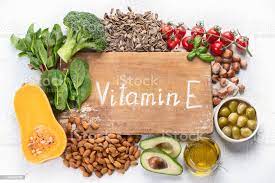Vitamin E| E | The Nutrition Source
Vitamin E
Introduction:
Vitamin E is a fat-soluble vitamin that has an important effect on the human health. It is found in foods and also in the form of supplements and vitamin E oil (for application on the skin). But the best source of the all nutrients including this vitamin is the food. Vitamin E occurs in eight different forms that are four tocopherols (alpha, beta, gamma and delta) and the other four are tocotrienols. The deficiency of this vitamin is rare but the overconsumption can cause problems. The best sources of this vitamin are nuts and seeds. In this article, the discussion will be about the benefits of vitamin E, sources, dosage and the issues related to it.
Benefits of vitamin E:
The vitamin E offers many benefits to the human body. These may include:
It acts as an anti-aging and anti-oxidant vitamin.
Due to its anti-oxidant properties, vitamin E oil is mostly added to cosmetic products because it has healthy effects on skin preventing wrinkles, linings and thus leaving the skin smooth and fair.
It prevents the coronary heart diseases, improves the immune system, prevents inflammation and cell damage and protects against eye cataracts.
It also prevents cancer by destroying the free radicals that initiate the cancer. Free radicals are usually the electrons that can cause the oxidation or destruction of the cellular body parts. It is due to its anti-oxidant property.
It also works against Alzheimer’s disease and lowers the risks of dementia.
Vitamin E has strong protective role against atherosclerosis by preventing oxidation of LDL.
Its anti-oxidant property prevents the plaques formation and formation of blood clots on arteries wall.
Vitamin E has its role in the production of compounds known as prostaglandins which are responsible for regulating blood pressure and muscle contraction.
Vitamin E also has its role in the muscle repair after exercise.
Vitamin E oil acts as a moisturizer and prevents the skin from drying and being flaked up.
Vitamin E can also promote wound healing.
It can benefit the allergic reactions and infections and offer relief from itching.
Vitamin E supplements have been found effective in improving the symptoms of eczema that may include the itchiness, dryness and flaking of the skin.
Vitamin E can prevent and improve the symptoms of sunburn that may include burning and itching.
Vitamin E can also improve your nails health by preventing the yellow nail syndrome. It can also moisturize the cracked and dry skin around the nails bed.
Sources of vitamin E:
The dietary sources of vitamin E may include:
Almonds
Peanuts
Hazelnuts
Vegetables oil e.g sunflower oil, corn and soybean oil etc
Spinach
Broccoli
Sunflower seeds
Cabbage
Sweet potatoes
Tomatoes and;
Wheat germ etc
RDA Dosage of vitamin E:
The need of vitamin E varies for different age and conditions:
For infants up to one year, RDA ranges from 4 mg to 5 mg of vitamin E.
For the children from the age of 1-13 years, the RDA of vitamin E ranges from 6 mg to 11 mg.
For adults over the age 14, the RDA for both men and women is 15 milligrams.
For breast feeding ladies, the RDA of vitamin E is 19 mg.
Deficiency issues of vitamin E:
The vitamin E deficiency is very rare but still can occur. The deficiency of vitamin E occurs in those people that are suffering from the fat malabsorption. The symptoms that can indicate the vitamin E deficiency include:
Anemia
Ataxia
Retinopathy
Destruction of the nervous system (peripheral neuropathy)
Immune response dysfunction
Nerve damage
Skeletal myopathy
Over-consumption issues:
When the excess of the vitamin E is consumed cause many irritations and problems:
The consumption of vitamin E supplements can cause diarrhea, stomach cramps, nausea, weakness, fatigue, headache, skin allergy and many others.
The excess consumption of vitamin E can cause excessive bleeding, blurred vision and gonadal dysfunction.
The high intake of vitamin E supplements can also increase the mortality rate in people.
Conclusion:
So, in the light of above discussion vitamin E should be consumed in regulated and limited amounts because its deficiency doesn’t cause much harms as its overdoses do. Being a fat soluble vitamin, it is not excreted out of body and is stored. So, it shouldn’t be consumed above the normal because it can cause toxicity.













No comments